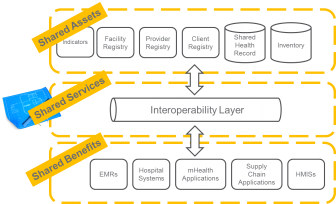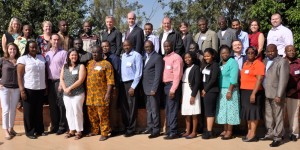Aug 1, 2014
Mapping Health Information System Competencies for Health Workers in Low- and Middle-Income Countries
The Health Information Systems Knowledge Hub’s Working Paper Series is the principal means to disseminate the knowledge products developed by the hub as easily accessible resources that collectively form a lasting repository of the research findings and knowledge generated by the hub’s activities. Working papers are intended to stimulate debate and promote the adoption of best practice for health information systems in the region. The series focuses on a range of knowledge gaps, including new tools, methods and approaches, and raises and debates fundamental issues around the orientation, purpose and functioning of health information systems.Jul 28, 2014
Atlas of eHealth country profiles 2013: eHealth and innovation in women
This publication is based on the findings of the 2013 WHO-ITU joint survey of 64 Commission on Information and Accountability for Women's and Children's Health (CoIA) countries by the WHO Global Observatory for eHealth.
Jul 17, 2014
BLN Webinar: Explaining Health Enterprise Architecture
eHealth, eHealth architecture, Products
Global
The Better Immunization Data Initiative Learning Network (BLN) recently hosted a webinar which outlined the basics for understanding and developing health enterprise architecture. Aimed at both technical and non-technical participants, the talk walked through, in plain language, what enterprise architecture is, why it is important, and how ministries of health can leverage straightforward techniques to develop a national-scale blueprint to guide their ICT investments.
Jul 14, 2014
Understanding the needs and wants of pregnant women and mothers
Maternal, perinatal and under-5 mortality in South Africa remain high. It is estimated that 40% of all deaths are avoidable. With the ubiquity of mobile services in developing markets, value-added services such as mobile money and mobile health (mHealth) are increasingly offered as a more convenient and cheaper solution for people to access not only information but also actual financial and healthcare services.
Jul 9, 2014
The BID Learning Network Launches in Kigali, Rwanda
Peer Learning, Policies, Practices, Products
Global, Rwanda
The BID Learning Network officially launched in Kigali, Rwanda on May 28-30th and brought together delegates from 13 different countries (Burkina Faso, Cote D’Ivoire, Ethiopia, Ghana, Kenya, Mozambique, Senegal, Tanzania, Uganda, Nigeria, South Africa, Rwanda, and Zambia) as well as international partners (WHO, UNICEF, and GAVI) to connect and discuss strategies for strengthening national immunization programs.
Jul 2, 2014
The Use of mHealth for Material Health Care in Ethiopia
mHealth, Peer Learning, Software, WHO
Ethiopia
"For the research in this thesis, we mainly followed a phase‐by‐phase evaluation and user‐centered approach. Cross‐sectional surveys were initially conducted to assess the role of HEWs and identify gaps in improving maternal health care service delivery. Then, considering mobile technologies as a potential solution for improving the performance of the health workers, we developed and evaluated a set of appropriate smartphone mHealth applications using open source components, including a local language adapted data collection tool, health worker and manager user‐friendly dashboard analytics and maternal‐newborn electronic forms/protocols. This thesis includes the technical details of the application and electronic protocols."
Jun 13, 2014
Summary of Survey Gap Analysis for DHS & MICS
The two most common household surveys conducted in developing countries to obtain nationally representative estimates of immunization coverage are the USAID-financed Demographic and Health Survey (DHS) and UNICEF-financed Multiple Indicator Cluster Survey (MICS). These surveys use similar methods and their results in terms of quality and precision are generally comparable.Jun 13, 2014
Improving the Reporting of Immunization Data
Standards, Supportive Supervision, Tools, Training, Unicef
Global
Jun 6, 2014
Patient De-Identification Handbook
eHealth, eHealth architecture, Patient De-Identification, Policies
Global
Jun 3, 2014
Summary of GAVI Alliance Investments in Immunization Coverage Data Quality
GAVI
Global, Summary of GAVI Alliance Investments in Immunization Coverage Data Quality
Jump in. Expand your knowledge.
Events
No upcoming events.
